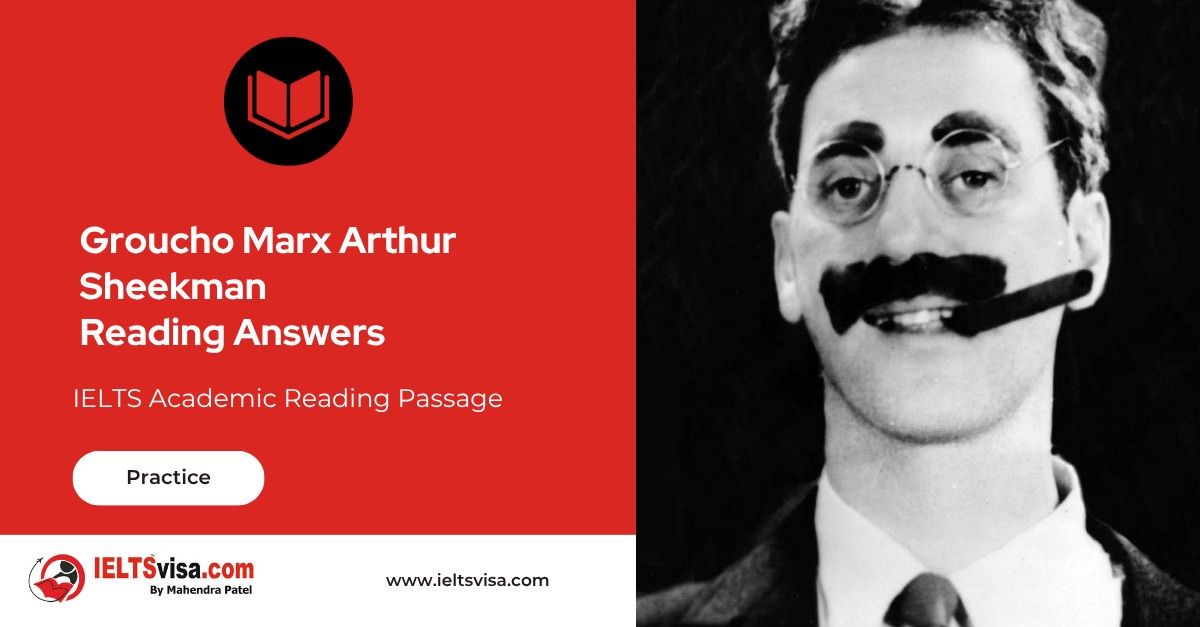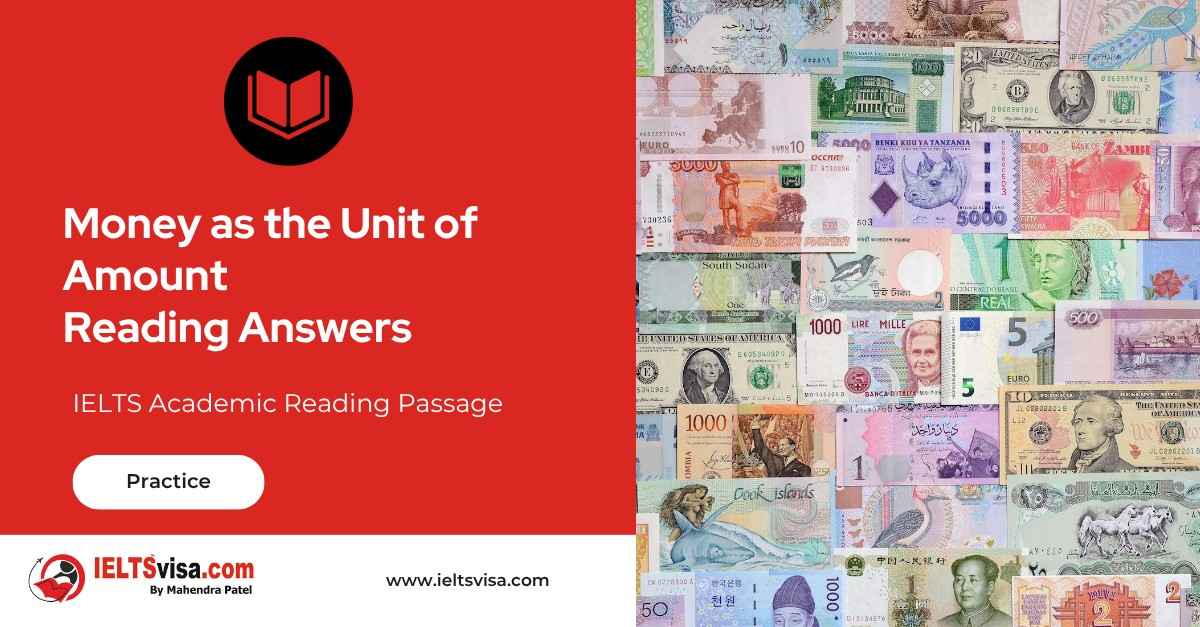Groucho Marx Arthur Sheekman Reading Answers
IELTS Academic Reading Passage
In a show-business career that spanned over seventy years, Groucho Marx successfully conquered every entertainment medium, becoming a star of the vaudeville stage, Broadway, motion pictures, radio, and television. But, as the author of seven books, a play, two film screenplays, and over one hundred magazine articles and essays, Groucho quietly conquered another medium, one in which he was as proud to work as any of the others. His writing is often overlooked in studies of his career, perhaps due to the quantity and variety of his other work.
Throughout his literary career, Groucho was dogged by the incorrect and unfair assumption by many critics and even by his biographer that he used a ghostwriter. Most Hollywood celebrities who wrote books had professional writers do the actual work. The fact that Groucho publicly stated on many occasions that he abhorred ghostwriters is clouded by his relationship with Arthur Sheekman. Friends for many years, Groucho and Sheekman had an unusual literary relationship. They worked in collaboration and each offered the other editorial help. For a brief time in the early 1940s, Groucho fronted for Sheekman, who was having trouble selling his work. By thus lending his name to another writer’s work, Groucho subjected all of his literary endeavors to suspicion from critics who simply refused to believe that an entertainer could write.
That some of Sheekman’s magazine pieces got into print under Groucho’s byline becomes apparent from reading the unedited correspondence between the two of them. The letters indicate that Groucho’s essays from this period fall into three categories: first, pieces written by Groucho with no input from Sheekman at all. In a July I, 1940, letter to Sheekman, Groucho asked, ‘Did you see that little piece written for Reader’s Digest? On March 17. in 1941, he wrote, ‘My drool is coming out in next week’s issue of This Week so cancel your subscription now.’ Clearly, Sheekman could not have had anything to do with a piece that he was told to look for.
The second and probably largest category of Groucho’s essays of this period consists of those written by Groucho and sent to Sheekman for editorial assistance. On July 20, 1940, Groucho wrote: I’m enclosing a copy of the piece I wrote. Probably another page or so is needed to complete it, but our starting date [for filming Go West ] came and I just haven’t had time to finish it. Let me know what you think of it and be honest because any other kind of opinion would be of no value to me. I won’t attempt to influence you by telling you the reactions I’ve already had, so for the love of God tell me the truth.’ Shortly thereafter, on October 10, Groucho wrote: ‘I received your suggestions on my piece – I’m glad you liked it if you did – you’re probably right about the beginning. I’ll do it over again.’ By the time Groucho wrote to Sheekman on July 25. In 1942, it appears that some sort of financial arrangement had been made regarding Sheekman’s suggestions. On that date, Groucho also wrote: I’m writing an unfunny piece on insomnia and I’ll send it in a week or so, I hope, for you to read – I’d like your opinion, proofread — correcting all the glaring illiteracies and, otherwise, do a fine polishing job.’
The remainder of Groucho’s essays from this period comprises the third category, Sheekman compositions with varying degrees of input from Groucho. The level of Groucho’s contributions to the articles in the third category ranges from actually suggesting the topic and drawing up an outline to simply rewriting a few paragraphs to inject his own style into the piece. On July 10, 1940, Groucho wrote: ‘I think you ought to try another political piece – a campaign thing – for This Week or some other magazine. This will be an extremely hot topic for the next few months and I think you should take advantage of it. If you’ll write to me, I’ll try to jot down a few items that you could complain about.’ Presumably, the chain of events would continue with Sheekman sending an essay to Groucho for his approval and whatever rewrites were needed. On May 29, 1940, Groucho wrote, ‘Received your piece and looked it over.’ In these letters to Sheekman, Groucho always referred to a piece as either ‘my piece’ or ‘your piece’. The letter continued, ‘I thought the piece was good … and I’ll send it to him and see if he can sell it… I’ll just rewrite a couple of paragraphs in your piece – not that I can improve them, but perhaps they’ll sound a little more like me.’ Groucho was concerned enough about this arrangement to take the care to at least make the piece somewhat his own.
Groucho really had no need for this entire enterprise. He gave the money to Sheekman and had no trouble getting his own work published. The principal reason for him submitting Sheekman’s work to magazines as his own was that it made Sheekman’s material easily marketable based on Groucho’s celebrity. Sheekman couldn’t have been altogether happy with the arrangement, but the reality was that he was periodically unemployed and the use of Groucho’s name brought in occasional paychecks. So it is not quite fair to call Sheekman Groucho’s ghostwriter. A more apt description of their literary relationship at this time is that Groucho occasionally fronted for Sheekman and offered him the services of his literary agent, while each offered the other editorial advice. The reasons for some of their collaborative efforts not being credited as such remain unexplained, but Groucho was never shy about crediting his collaborators, and in every other case he did so.
Questions 1-4
Do the following statements reflect the claims of the writer of Reading Passage 1?
In boxes 1-4 on your answer sheet ante
YES, if the statement agrees with the claims of the writer
NO, if the statement contradicts the claims of the writer
NOT GIVEN, if it is impossible to say what the writer thinks about this
- Groucho’s work as a writer was sometimes better than his work in other media.
- Groucho’s relationship with Sheekman cast doubt on his own abilities as a writer.
- Money was occasionally a source of disagreement between Groucho and Sheekman.
- Groucho occasionally regretted his involvement with Sheekman.
Questions 5-8
Complete the notes below.
Choose NO MORE THAN THREE WORDS from the passage for each answer.
Write your answers in boxes 5-8 on your answer sheet.
Groucho’s essays in the early 1940s
|
Category 1 |
Category 2 |
Category 3 |
|
Sheekman had 5……………. |
Sheekman provided 6……………… |
mostly 7…………………. |
|
– |
– |
Groucho added 8…………………… |
Questions 9-13:
Look at the following statements (Questions 9-13) and the list of dates of letters sent by
Groucho to Sheekman below.
Match each statement with the letter it relates to.
Write the correct letter A-Q in boxes 9-13 on your answer sheet.
9. Groucho referred to his own inadequacy with regard to the use of language.
10. Groucho explained his reason for amending an essay.
11. Groucho agreed that part of an essay needed revising.
12. Groucho drew Sheekman’s attention to an essay soon to be published.
13. Groucho suggested that an essay should adopt a negative point of view.

Solution For: Groucho Marx Arthur Sheekman
Reading Answers
| 1. Not Given | 2. Yes | 3. No | 4. Not Given |
| 5. no input | 6. editorial assistance | 7. Sheekman compositions | 8. his own style |
| 9. E | 10. G | 11. D | 12. B |
| 13. F |
Review and Practice
- Regularly practice with IELTS reading samples and time yourself to get used to the pressure of the exam.
- Review your mistakes to understand where you went wrong and how to avoid similar errors in the future.
Our Books
Master IELTS Speaking Part 1
IELTS Writing Task 1 Book
IELTS Writing Task 2 Book
Groucho Marx Arthur Sheekman Reading Answers Explanation
Comin Soon
Practice IELTS Other Modules
IELTS Listening
The IELTS Listening test assesses how well you can understand spoken English in various contexts. It lasts about 30 minutes and is divided into four sections with a total of 40 questions. The listening tasks become increasingly difficult as the test progresses.
IELTS Academic Reading
The IELTS Academic Reading section assesses your ability to understand and interpret a variety of texts in academic settings. It is designed to evaluate a range of reading skills, including skimming for gist, reading for main ideas, reading for detail, understanding inferences, and recognizing a writer's opinions and arguments.
IELTS Speaking
The IELTS Speaking test assesses your ability to communicate in English on everyday topics. It lasts 11-14 minutes and consists of three parts: introduction, cue card, and a discussion based on the cue card topic.
IELTS General Reading
IELTS General Reading tests your ability to understand and interpret various types of texts. Here are some key areas and types of content you can expect to encounter in the reading section, along with tips for effective preparation.
IELTS Academic Writing Task 1
In IELTS Academic Writing Task 1, you are presented with a visual representation of information, such as graphs, charts, tables, or diagrams, and you are required to summarize, compare, or explain the data in your own words.
IELTS General Writing Task 1
In IELTS General Writing Task 1, you are required to write a letter based on a given situation. The letter can be formal, semi-formal, or informal, depending on the prompt. Here’s a breakdown of the key components to include in your letter
IELTS Academic Writing Task 2
In IELTS Academic Writing Task 2, you are required to write an essay in response to a question or topic. Here’s a guide to help you understand the essential elements of this task
IELTS Exam Tips
To succeed in the IELTS exam, practice regularly, familiarize yourself with the test format, improve your vocabulary, develop time management skills, and take mock tests to build confidence.
Grammer for IELTS
Grammar is the foundation of effective communication in English. Understanding tense usage, subject-verb agreement, and sentence structure enhances clarity and coherence in writing and speaking.
Vocabulary for IELTS
Vocabulary plays a crucial role in the IELTS (International English Language Testing System) exam, especially in the Speaking and Writing sections. Here’s an overview of why vocabulary is important and how it impacts your performance
RECENT IELTS SAMPLES QUESTIONS AND ANSWERS
Walking with dinosaurs
Peter L. Falkingham and his colleagues at Manchester University are developing techniques that...
Money as the Unit of Amount Reading Answers
The most difficult aspect of money to understand is its function as a unit of account. In...
WEATHERING IN THE DESERT
In the deserts, as elsewhere, rocks at the earth's surface are changed by weathering, which...
Nature on Display in American Zoos
The first zoo in the United States opened in Philadelphia in 1874, followed by the Cincinnati...
Can We Prevent the Poles From Melting
Such is our dependence on fossil fuels, and such is the volume of carbon dioxide we have...
Air conditioning the earth reading answers
The circulation of air in the atmosphere is activated by convection, the transference of heat...













